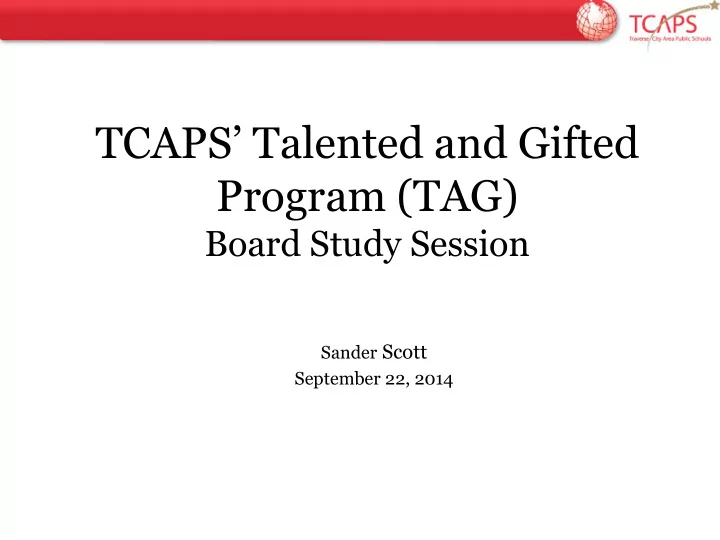

TCAPS’ Talented and Gifted Program (TAG) Board Study Session Individua l Sander Scott September 22, 2014
Rational Choice Decision Making Process Individua l
Vision Statement TCAPS One Page Strategic Plan Every learner will reach his or her potential in an engaging, inspiring, and challenging Individua l environment.
TAG Mission Extension of TCAPS Vision Some students require a different experience in order to reach that potential - to be Individua l engaged, inspired, and challenged.
Key Stakeholders ● Students ● Parents ● TAG Teachers ● Community Individua l
Possible Options Begin with the End in Mind ● Use Current Criteria (Status Quo) ● Set Number of Seats - Fill Slots ● Accelerated Program (Self-Select with counsel) ○ 4-5 Blended (Multi-Age) ● Service Students at Their Home School - Traveling Teachers Individua l ● Menu of Options ○ Current Program ○ Accelerated Program ○ Differentiation at Every Site
What is TAG? ● TAG is a magnet school for identified students. ● TAG provides appropriate learning experiences to meet the academic, social, and emotional needs of these students. ● Grades four and five are serviced at Central Individua l Grade School.
How did TAG Begin? ● The talented and gifted (TAG) program began at the West Junior High School about 25 years ago. ● It began in the 7th grade with classes in math, geography, and language arts. ● Initially, it housed about sixty students in a multi- Individua l age setting, in grades 4-6.
*Ratings and weighted values developed based on recommendations from NWEA, CogAT, and the National Association for Gifted Children.
Q & A Why aren’t students opting to take the test or accepting an invitation? ● Parents are happy with their home school ● Avoid controversial nature of TAG ● Don’t know about the program and what it has to offer Is the program appropriate? ● Yes, currently, the identification process matches the program. What other options are available for students to enter the program? ● Students who were not accepted into the program in 4th grade may test again, after one year, for entrance into TAG’s 5th grade program How can we reach more students? ● East/West side offerings ● Transportation solutions ● Teacher training - district wide differentiation ● Provide CogAT to every 3rd grader ● Menu of services
Student Achievement TAG students’ ACT results compared to Non -TAG student results Traditional Students English Mathematics Reading Science Composite 20.3 20.3 21.3 21.2 20.9 TAG Students Individua l English Mathematics Reading Science Composite 29.9 28.2 29.6 28.2 29.1 Of the 13001 AP tests taken (between 03-04 SY and 13/14 SY), 2810 or 21.6% are taken by TAG students (approx. 570 students). TAG student proficiency is 92.4% , while non-TAG students proficiency is 75.6% .
TAG Students by Year fiscal year TAG Count 2003/04 139 2004/05 138 2005/06 134 2006/07 128 2007/08 133 2008/09 97 2009/10 69 2010/11 70 2011/12 70 2012/13 84 2013/14 72 *“TAG Busing – Discontinue” was a 2006/2007 budget reduction for a cost savings of $35,000 at that time.
TAG Students by Grade and Year
Where Do TAG Students Come From? Do Students Stay with TCAPS after TAG? ● Of the 570 individual TAG students, 68 or 11.93% began attending TCAPS for the 1st time as a TAG student. ● Of the 68 new to TCAPS TAG students, 58 or 85.3% continues one or more years with TCAPS after completing TAG
What’s Next for TAG Students Of the original 570 students in TAG from 03/04 to 13/14, 446 or 78.3% continued on to AT. (The AT designation was not tracked automatically until we began using Pinnacle in 2010/11. Therefore TAG students entering AT before 2011/12 would have been reliant on hand entry.)
Timeline for TAG ✓ Completed Action Items ○ Parent and community input session ○ Review at Board Curriculum meetings ○ Review at Board Policy meeting ○ Review of Spring NWEA scores and invite students to August testing ○ Review appeals based on Spring NWEA scores ● Upcoming Work ● September 22 - Study Session at the Board ■ Session to include parents, teachers, and selection committee ● September - October ○ Develop a TAG A3 with Principals to gather input district-wide using SWOT Analysis ○ Develop Comprehensive PD Plan – gather input ○ TAG Parent/Community Member Mtg (SWOT) ● November - Board Curriculum ○ Present 3-5 Year PD Plan with Budget Estimates ● December – Board Curriculum ○ Review Preliminary Recommendation, SWOT Analysis, A3 ● January – Full Board ○
Recommend
More recommend